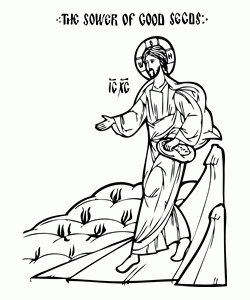 The Gospel readings for the week of July 5th include Matthew 13: 10-43.
The Gospel readings for the week of July 5th include Matthew 13: 10-43.
These verses come after Jesus has just told the crowd the Parable of the Sower. It describes various kinds of ground, and the seeds that fall on the ground as the sower works. Some seeds die because they are scorched by the sun or choked by thorns, eaten by birds or withered in soil that isn’t deep enough to sustain them. But the seeds that fall on good soil bring forth abundant grain.
In verse 10, the disciples ask Jesus why He speaks to the people in parables. He answers: “The reason I speak to them in parables is that ‘seeing they do not perceive, and hearing they do not listen, nor do they understand.'” His words are close to the message the prophet Isaiah is commanded to give the people (Isaiah 6: 9-10).
Commentators on this passage note that the Lord’s words have different meanings for different kinds of people. Those who are willing to hear and spiritually sensitive will gain understanding. But those who are hard-hearted, who are unwilling and spiritually insensitive, will only hear a story. They won’t heap up condemnation on themselves by rejecting the message Christ is giving in the parable. So Christ makes His point in this way as an act of mercy toward those who do not want to hear Him. They are represented, in the parable, as the seeds that fall “by the wayside” as the King James Version has it.
The following verses include the Parable of the Mustard Seed and the Parable of the Leaven (or Yeast). Biblical scholar Joachim Jeremias writes in his book “The Parables of Jesus” that the words of these parables are often mistranslated. Jesus is not saying that the Kingdom of God is like a mustard seed, or like yeast that a woman mixes with flour. He is saying that it is the same way with the Kingdom that it is with a mustard seed or a morsel of yeast. Jeremias writes that the meaning of both parables is that “out of the most insignificant beginnings, invisible to [the] human eye, God creates His mighty Kingdom, which embraces all the peoples of the world.”
Jeremias goes on to say that with these words about the mustard seed and yeast, Jesus is actually talking about His disciples, who will spread the Gospel and build up the Kingdom. He knows that doubtful people are asking whether this “wretched band, comprising so many disreputable characters” can actually “be the wedding-guests of God’s redeemed community.” Jesus’ answer is that the Father will “cause My small band to swell into the mighty host of the people of God in the Messianic Age, embracing the Gentiles.”
But to see this miracle, a person must be patient. The miracle only happens over time, just as a small, frail seed can grow into a lush plant only with time and with patient, unhurried tending by the sower.
To us, who read and listen to these words, Jesus says, “He who has ears, let him hear.”
Photo Gallery
-
Posts Archive
-
Links
